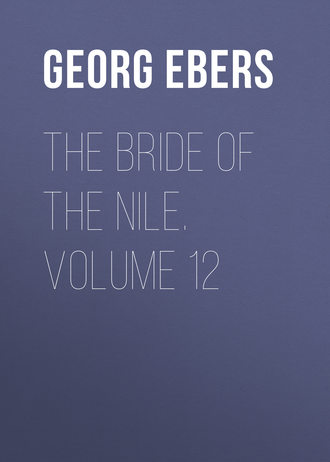
Georg Ebers
The Bride of the Nile. Volume 12
At this moment the clang of bells was heard from the town with a terrific and unaccountable uproar, and a young man was seen forcing his way through the throng, a naked sword in his hand, and in spite of his torn garments, his wild hair, and his blackened face, he was at once recognized as Orion. Every one made way for him, for he rushed on like a madman; as he reached the pontoon and took in at a glance what was going forward there, he sprang past the mummers with mighty leaps to the platform, pushing aside sundry groups of fighting champions; and before the principal actors were aware of his presence, he had snatched Paula from the old man's clutch, and called her by her name. She sank on his breast half-fainting with terror, surprise and unspeakable rapture, and he clasped her to him with his left arm, while the flashing sword in his right hand and his flaming looks warned all bystanders that it would be as wise to attack a lioness defending her young as to defy this desperate man, who was prepared to face death with the woman he loved.
His push had sent Horapollo tottering to some distance; and when the old man had pulled himself together, to throw himself once more on his victim, he found himself the centre of a fight. A wild troop had followed Orion and beset the struggling mob, whom they presently drove over the edge of the pontoon into the river, and with them Horapollo. Most of these saved themselves by swimming, but the old man sank, and nothing more was seen of him but his clenched fist, which rose in menace for some minutes above the waters.
Meanwhile the Vekeel had become aware of what was going forward on the platform; he leaped in fury from his seat to restore order, intending to seize Orion whom he fancied he had seen, or, if necessary to cut him down with his own hand.
But a vast multitude stopped his progress, for a fearful horde of released prisoners with Orion at their head had come rushing down to the scene of the festival yelling: "Fire! the prison is burning, the town is in flames!"
Every one who could run fled at once to Memphis to save his house, his possessions and those dear to him. Like a flock of doves scared by the scream of a hawk, like autumn leaves driven before the wind, the multitude dispersed. They hurried back to the town in wild tumult and inextricable confusion, jumping into the festal cars, cutting loose the horses from that of the goddess of health, to mount them and ride home, overthrowing everything that stood in their way and dragging back the Vekeel who was striving, sword in hand, to get to the pontoon.
The smoke and flames of the city were rising every moment, and acted like magic in spurring the flying crowd to reach their homes in time. But, before Obada had succeeded in his efforts, the pushing throng were once more brought to a standstill; horses were heard approaching. Dense masses of dust hid them and their riders; but it was certainly an armed troop that was coming clattering onwards, for flashing gleams were seen here and there through the dull clouds that shrouded them, the reflection of the sun's bright rays from polished and glittering helmets, breast- plates, and sabres.
Now they were visible even where the Vekeel was. Foremost rode the Kadi, and just as he came up with Obada he sprang from the saddle on to the wooden structure, and with a loud cry of: "Free-saved!" in which all the joy of his heart found utterance, he stretched out both his hands to Paula, who was advancing towards the shore clinging closely to Orion.
Othman did not observe the Vekeel, who was but a few paces distant. The words "Free!" "Saved!" from the supreme judge, gave the negro to understand that a pardon must have arrived for his youthful foe, and this of course implied the condemnation of his own proceedings. All his hopes were wrecked, for this meant that Omar still ruled and that the attempt on the Khaliff's life had failed. Dismissal, punishment or death must be his doom, when Amru should return. Still, he would not succumb till the instrument of his ruin had preceded him to the grave. Taking the Kadi by surprise he thrust him aside, and prepared to deal a fearful blow that should fell Orion before he himself should fall. But the captain of the body-guard, who had followed Othman, had watched his movements: Swift as lightning he rose in his saddle and swung his cimeter, which cut deep into the Vekeel's neck. With a hideous curse Obada let his arm drop, and fell struggling for his last breath at the feet of the newly united couple.
The populace afterwards declared that his blood was not red like that of other men, but black like his skin and his soul. They had good cause to curse his memory, for his villainy had reduced more than half Memphis to ashes that day, and brought the city to beggary.
He had hired two venial wretches to set fire to the prison while the festival was proceeding, with a view to suffocating Orion in his cell; but the gang were detected and all the prisoners were released in time. Thus the young man had been able to reach the scene of the ceremonial at the head of his fellow-captives. The fire, however, had gained the upper hand in the deserted town. It had spread from house to house along the sun-scorched streets, and next day nothing remained of the city of the Pyramids but the road along the shore, and a few wretched alleys. The ancient Capital of the Pharaohs was reduced to a village, and the houseless residents moved across to the eastern bank, to people as Moslems the newly-founded town of Fostat, or sought a home on Christian territory.
Among the houses that had escaped was that of Rufinus, and thither the Kadi escorted Orion and Paula. It was to serve as their prison till the return of Amru, and there they spent delightful days in the society of their friends, and there Thomas was so happy as to clasp his children to his heart once more, and bless them before he died.
A few minutes before the Kadi had reached the scene of the festival two carrier pigeons had arrived, each bearing the Arab governor's commands that the sacrifice of Paula was at any rate to be stopped, and her life spared till his return. He also reserved the right of deciding Orion's fate.
Mary and Rustem had met Amru at Berenice, on the Egyptian coast of the Red Sea. This decaying sea-port was connected with Medina by a pigeon- post, and in reply to his viceroy's enquiry with reference to the victim about to be offered by the despairing Egyptians to the Nile, Omar had sent a reply which had been immediately forwarded to the Kadi.
The burning of their town had brought new and fearful suffering on the stricken Memphites, and notwithstanding Katharina's death the Nile still did not rise. The Kadi therefore once more summoned a meeting of all the inhabitants from both sides of the river, three days after the interrupted marriage-festival. It was held under the palms by Nesptah's inn, and there he proclaimed to the multitude, Moslem and Christian, by means of the Arab herald and Egyptian interpreter, what the Khaliff commanded him to declare, namely: that God, the One, the All-merciful, scorned human sacrifice. In this firm conviction he, Omar, would beseech Allah the Compassionate, and he sent a letter which was to be cast into the river in his name.
And this letter was addressed:
"To the River of Egypt." And its contents were as follows:
"If thou, O River, flowest of thyself, then swell not; but if it be God, the One, the Compassionate, that maketh thee to flow, then we entreat the All-merciful that he will bid thee rise!"
"That which is not of God," wrote Amru in the letter which enclosed Omar's, "what shall it profit men? But all things created are by Him, and so is your noble river. The Most High will hearken to Omar's prayers and ours, and I therefore command that all of you—Moslems, Christians, and Jews, shall gather together in the Mosque on the other side of the Nile which I have built to the glory of the All-merciful, and that you there lift up your souls in one great common prayer, to the end that God may hear you and take pity on your sufferings!"
And the Kadi bid all the people to go across the Nile and they obeyed his bidding. Bishop John called on his clergy and marched at their head, leading the Christians; the priests and elders of the Jews led their people next to the Jacobites; and side by side with these the Moslems gathered in the magnificent pillared sanctuary of Amru, where the three congregations of different creeds lifted up, their hearts and eyes and voices to the pitying Father in Heaven.
And this very Mosque of Amru has more than once been the scene of the same sublime spectacle; even within the lifetime and before the eyes of the narrator of this tale have Moslems, Christians, and Jews united there in one pious prayer, which must have been acceptable indeed in the ears of the Lord.
Not long after the letter from the Khaliff Omar had been cast into the Nile, and the prayer of the united assembly had gone up to Heaven from the Mosque of Armu, a pigeon came in announcing a sudden rise in the waters at the cataracts; and after some still anxious but hopeful days of patience, the Nile swelled higher and yet higher, overflowed its banks, and gave the laborer a right to look forward to a rich harvest; and then, when a heavy storm of rain had laid the choking dust, the plague, too, disappeared.
Just when the river was beginning to rise perceptibly Amru returned; bringing in his train little Mary and Rustem, Philippus the leech and Haschim, who had joined the governor's caravan at Djidda.
In the course of their journey they received news of all that had been happening at Memphis, and when the travellers were approaching their last night-quarters, and the Pyramids were already in sight, the governor said to little Mary:
"What do you say little one? Do we not owe the Memphites the treat of a splendid marriage festival?"
"No, my lord, two," replied the child.
"How is that?" laughed Amru, "You are too young and do not count yet, and I know no other maiden in Memphis whose wedding I should care to provide for."
"But there is a man towards whom you feel most kindly, and who lives as lonely as a recluse. I should like to see him married, and at the same time as Orion and Paula. I mean our good friend Philippus."
"The physician? And is he still unwed?" asked Amru in surprise; for no Moslem of the leech's age and position could remain unmarried without exposing himself to the contempt of his fellow-believers. "He is a widower then!"
"No," replied Mary. "He has never yet found a wife to suit him; but I know one created on purpose for him by God himself!"
"You little Khatbe!"—[ A professional go-between]—cried the governor. "Well, settle the matter, and it shall be no fault of mine if the second wedding lacks magnificence."
"And we will have a third!" interrupted the child, clapping her hands and laughing. "My worthy escort Rustem….
"The colossus! Why, child, to you all things are possible! Have you found a wife for him too?"
"No, he found Mandane for himself without my help."
"It is the same thing!" cried the governor jovially. "I will provide for her. But that must satisfy you, or else all those unbelievers whom we are settling here will drive us Moslem Arabs out of the land."
The great man had often held such discourse as this with the child since she had entered his tent at Berenice, there to lay before him the case of the couple she loved, and for whom she had taken on herself great risk and hardship; she had pleaded so eloquently, so kindly, and with such fervent and pathetic words, that Amru had at once made up his mind to grant her everything that lay in his power. Mary had done him a service, too, by bringing him the information she could give him, for it enabled him to avert perils which threatened the interests of the Crescent, and also to save the children of two men he honored—the son of the Mukaukas, and the daughter of Thomas—from imminent danger.
He found, on his return home, that the Vekeel's crimes far exceeded his worst fears. Obada's proceedings had begun to undermine that respect for Arab rule and Moslem justice which Amru had done his utmost to secure. It was only by a miracle that Orion had escaped his plots, for he had three times sent assassins to the prison, and it was entirely owing to the watchful care of pretty Emau's husband that the youth had been able to save himself in the fire. Obada had done all this to clear out of his path the hated man whose statements and impeachments might ruin him. The wretch had met a less ignominious death than his judges would have granted him. The wealth found hoarded in his dwelling was sent to Medina; and even Orion was forced to see the vast sums of which the Negro had plundered his treasury, appropriated by the Arabs. The Arab governor thought it only right to inflict this penalty for the share he had taken in the rescue of the nuns; and the young man submitted willingly to a punishment which restored him and his bride to freedom, and enabled Amru to apply a larger proportion of the revenues of his native land for its own benefit.
The Khaliff Omar, however, never received these moneys, which constituted far more than half of Orion's patrimony. The Prophet's truest friend, the wise and powerful ruler, fell by the assassin's hand, and the world now learnt that the Vekeel had been one of the chief conspirators and had been spurred on to the rashest extremes by his confidence of success.
Amru received the son of the Mukaukas as a father might; after examining the result of his labors he found it far superior to his own efforts in the same direction, and he charged Orion to carry out the new division of the country, which he confirmed excepting in a few details.
Perform your duty and do your utmost in the future to go on as you have begun!" cried Amru; and the young man replied:
"In this bitter and yet happy interval I have become clear on many points."
"And may I ask on what?" asked the governor. "I would gladly hear."
"I have discovered, my lord," replied Orion, "that there is no such thing as happiness or unhappiness in the sense men give to the words. Life appears to each of us as we ourselves paint it. Hard times which come into our lives from outside are often no more than a brief night from which a brighter day presently dawns—or the stab of a surgeon's knife, which makes us sounder than before. What men call grief is, times without number, a path to greater ease; whereas the ordinary happiness of mankind flows, swiftly as running waters, down from that delightful sense of ease. Like a ship, which, when her rudder is lost, is more likely to ride out the storm on the high seas than near the sheltering coast, so a man who has lost himself may easily recover himself and his true happiness in the wildest turmoil of life, but rarely and with difficulty if his existence runs calmly on. All other blessings are comparatively worthless if we are not upheld by the consciousness of fulfilling the task of life in faithful earnest, and of cheerfully dealing with the problems it sets before us. The lost one was found as soon as he placed his whole being and faculties at the service of a higher duty, with God in his heart and before his eyes. I have learnt from my own experience, and from Paula's good friends, to strive untiringly after what is right, and to find my own weal in that of others.
"The sense of lost liberty is hard to bear; but leave me love, and give me room and opportunity to prove my best powers in the service of the community, even in a prison—and though I cannot be perfectly happy, for that is impossible without freedom—I will be far happier than such an idle and useless spendthrift of time and abilities as I used to be among the dissipations of the capital."
"Then enjoy the consciousness of duty well performed, with liberty and love," replied the governor. "And believe me, my friend, your father in Paradise will no more grudge you all that is loveliest and best than I do. You are on the road where every curse is turned to blessing."
The three marriages which Amru had promised to provide for, were celebrated with due splendor.
That of Orion and Paula was a day never to be forgotten by the gay world of Memphis. Bishop John performed the ceremony, and the young couple at once took possession of the beautiful house left them by Katharina, the real Bride of the Nile. If it could have been granted to her to read Paula's and Orion's hearts, and see how they held her in remembrance, she would have found that to them she was no longer the childish water- wagtail, and that they knew how to value the sacrifice of her young life.
Their first beloved guest, who went with them to their new home, was little Mary, and she remained their dearest companion till she married happily. The governess, Eudoxia, to whom also Orion offered an asylum, accompanied Mary to her own delightful home; and there at last Mary closed her old friend's eyes, after the good woman had brought up her little ones, not like a hireling but as a true mother.
The Patriarch Benjamin, too, who was led by many considerations—and not least by Katharina's will to remain on good terms with the son of the Mukaukas, was a visitor to the youthful pair. Neither he nor the Church ever had reason to repent his alliance with Orion; and when Paula presented her husband with a son, the prelate offered to be his sponsor, and named him George after his grandfather.
Orion's son, too, inherited the office of Mukaukas, when he came to man's estate, from his father who was appointed to it, but under a new Arab title, shortly after his marriage.
Ere long, however, Orion, as the highest Christian authority in his native land, had to change his place of residence and leave Memphis, which was doomed to ruin, for Alexandria. From thence his power extended over the whole Nile-valley, and he devoted himself to his charge with so much zeal, fidelity, justice, and prudence, that his name was remembered with veneration and affection by generations long after.
Paula was the pride and joy of his life, and they lived together in devoted union to an advanced age. He regarded it as one of the duties of his life, to care for the woman who had made him what he was from a lost and reprobate creature, and to fill every day of her life with joy. When he built his palace at Alexandria, he graced it with the inscription that had been engraved on Thomas' ring: "God hath set the sweat of man's brow before virtue."
Philippus and his Pulcheria also found a new home in Alexandria. He had no long wooing to do; for when, on his return, the girl of whom he had thought constantly during his long journeying, met him for the first time in her mother's house and held out both her hands with trustful warmth of welcome, he clasped her to him and would not release her till Joanna had given them her maternal blessing. The widow lived in the leech's house with her children and grandchildren, and often visited her husband's grave. At length she was laid to rest by him and his soft-hearted mother, in the cemetery of Alexandria.
Rustem, made a rich man by Orion, became a famous breeder of horses and camels in his own country, while Mandane ruled mildly but prudently over his possessions—which he never shared with others, though he remained a Masdakite till he died. The first daughter his wife bore him was named Mary, and the first boy Haschim; but she would not agree to Rustem's proposal that the second should be called Orion; she preferred to give him the name of Rufinus, and his successors were Rustem and Philippus.
The senator and his wife were only too glad to quit Egypt. Martina, however, had the satisfaction of assisting at the marriage of her dear Heliodora on the shores of the Nile; not, indeed, to her "Great Sesostris," but to her nephew Narses, who by the young widow's devoted care was restored, if not to perfect vigor, at any rate to very endurable good health.
Paula's wedding gift to her was the great emerald, which had meanwhile been brought back again to Memphis. Justinus and Martina always remained on terms of cordial friendship with the young Mukaukas and his wife: Nilus lived long after to perform his duties with industry and judgment; and whenever Haschim came to Alexandria there was a contest between Orion and Philippus, for neither would yield him to the other. But Philip could no longer envy his former rival the wife he had won. He had not, indeed, ceased to admire her; but at the same time he would say: "My comfortable little Pulcheria has not her match; our rooms would be too small for Paula, but they suit my golden-haired girl best."
He remained unselfishly devoted to his work till the end, and, when he saw Orion wearing himself out in energetic toil, he would often say: "He knows now what life demands, and acts accordingly; and that is why he grows no older, and his laugh is as winning and gay as ever. It is an honor to be called friend by a woman who like the Bride of the Nile. saved herself from certain death, and a man who, like the young Mukaukas, has freed himself from the heaviest of all curses."
To this day the Bride of the Nile is not forgotten. Before the river begins to rise on the Night of Dropping the inhabitants of the town of Cairo, which grew up after the ruin of Memphis, on the eastern shore by the side of Fostat, erect a figure of clay, representing a maiden form, which they call Aroosa or the Bride.







